Multilateralism
Fondation Robert Schuman,
IFOP Institut français d'opinion publique
-

Available versions :
EN
Fondation Robert Schuman
IFOP Institut français d'opinion publique
The IFOP survey for the Robert Schuman Foundation was undertaken in five European countries (France, Germany, Spain, Italy and Poland) amongst representative samples of their national population aged 18 years and over in November 2016. From the state of this opinion five months after the British vote, we can conclude that the Europeans continue to relativize the UK's departure from the EU, in spite of some lingering, although somewhat reduced, concern regarding the economic impact of the Brexit. People have started to accept the idea of the British departure, showing with the greatest goodwill their hopes for EU-UK relations during the negotiations that are now to come.
1. No alarmism about the Brexit ...
European public opinion as a whole does not seem to consider the victory of the "leave" vote five months ago a catastrophe. Without taking this decision lightly however it seems that in most of the countries questioned, at most three interviewees in ten deem the issue "very serious because it is one of the main Member States and one of the main European economic powers which is leaving the European Union" (19% of the French, 25% of the Germans, 31% of the Spain and Italians). Only the Poles clearly show extreme concern following the departure of the UK (55% believe the decision to be very serious). The others, without being alarmist, believe rather that the Brexit 'is not as bad as all that since the UK has always had a separate status in Europe and has always impeded progress towards European integration (45% of the French, 38% of the Germans, 40% of the Spanish, 44% of the Italians).
Several elements can explain this serene position on the part of most major member countries and Poland's greater concern:
• The status granted to the UK in the EU and, notably, it not belonging to the euro zone and the Schengen area, help to relativize the situation: indeed we might imagine that response would have been more alarmist had another major euro zone member country decided to leave the Union.
• Concern is greater amongst the Poles and can undoubtedly be explained by the many links the country has with the UK, notably comprising the presence of 800,000 Poles in Britain, and also by the recent entry of Poland into the European family.
• The fact that Poland also enjoys the status of Member State without belonging to the euro zone and that its positions sometimes converge with those of the UK regarding issues of European governance have also certainly had an impact on the perceived seriousness of the Brexit in this country.
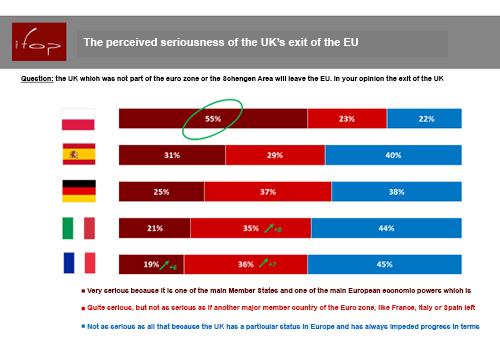
Although the older members seems to be much more serene, we should note however this concern is increasingly shared - to a lesser a degree of course than in Poland - by French and Italian public opinion. Indeed, since July a growing share deem that the exit of the UK is "Quite serious, but not as serious as if another major member country of the euro zone, like France, Italy or Spain left the EU" (from 29% of the French in July 2016 to 36% in November 2016, from 27% to 35% of the Italians), and even "Very serious because it is one of the main Member States and one of the main European economic powers which is leaving the EU" (from 13% to 19% of the French).
Alternatively it is interesting to note that voters on the far right, less attached to the European institution, relativize the exit of the UK from the EU more. This is the case in France (55% of Marine Le Pen's 2012 voters believe that it is not so serious, in Italy (59% of the Northern League and 55% of the populist Five Stars Movement) and in Germany (54% amongst AfD voters).
2. ...in spite of concern about the economic impact of the "Leave" vote ...
Interviewed about the anticipated consequences of the Brexit on the British economy, interviewees struggle to adopt a position. The difficulty in projecting themselves seems quite logical in that on the one hand, there is no precedent to help form an opinion and in which, on the other, the real impact of the Brexit is not emerging clearly in the UK. In detail it seems though that in all of the countries surveyed the neutral answer "the British economy will neither be boosted nor weakened by the decision to leave the EU" achieves significantly lower scores than the neutral response regarding the impact of the Brexit on each national economy - between 19% and 32% for the British economy and 31% and 41% for the national economy. Everything is occurring then as if European public opinion had a much better idea about the consequences of the exit of the EU for the British economy than for their own.
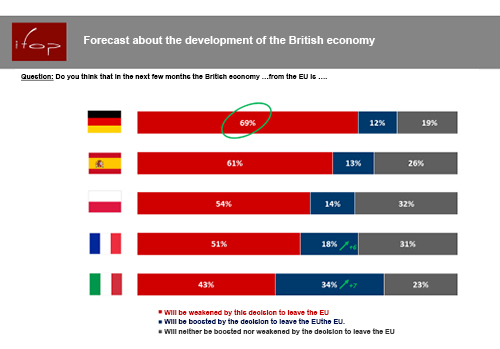
More precisely, most Europeans fear that the British economy will be weakened by the decision to leave the EU, particularly the Germans and Spanish (51% of the French, 69% of the Germans, 61% of the Spanish, 54% of the Poles). The Italians are an exception to this in that just under half of them believe this (43%). Hence it has to be said that on this point the sovereigntists seem for the time being to have lost the battle for public opinion since in all of the countries surveyed the share of interviewees who forecast negative consequences for the British economy is much higher than that who anticipate that the Brexit will boost the economy as the UK frees itself from Europe's stranglehold. Since July however concern about the British economy has been relativized notably amongst the Poles - where it was firmly established at the beginning (between 62% and 54% forecast a weakening in the British economy) and also amongst the French and Italians who increasingly think that this crisis will ultimately be beneficial to the British economy (between 12% and 18% of the French believe that the UK's economy will be boosted by the decision to leave the EU, between 27% and 34% of the Italians).
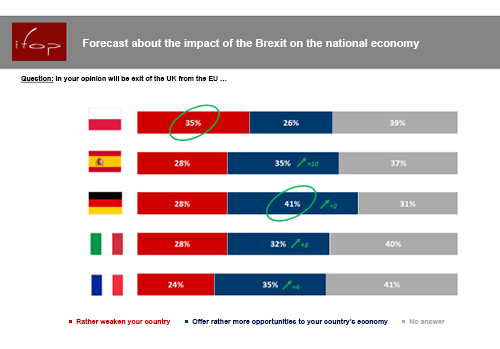
As far as the impact on the respective national economy of each country is concerned it seems that those interviewed find this more difficult to assess; most of those interviewed prefer not to say anything and the fact that opinions are greatly divided bears witness to this. However it has to be admitted that Germany, the euro zone's leading economy, seems clearly more confident in terms of its assets: 41% of the German perceive economic opportunities for their country (against 35% of the French and the Spanish, 32% of the Italians and 26% of the Poles). Conversely the Poles are the ones who fear the weakening of their economy the most (35%), since the emerging economic situation and the fact that it is a new member of the European area probably makes them less confident in their ability to absorb disruption like this; this is all the more so since the possibility of the massive return of Polish expatriate workers from the UK cannot be ruled out. However we should note that as a consequence of signs of recovery in the Spanish economy the share of Spanish interviewees who are optimistic about their economy has been rising this summer (35%, +10 points in comparison with July 2016). This trend can also be seen in the other countries but it is not as pronounced: in France (+4 points), in Germany (+2 points), in Italy (+3 points).
3. ...and the fear of the knock-on effect
The theory of the risk of contagion has led to a certain amount of divergence within European public opinion. On the one hand a small majority of the Germans and Spanish believe that following the exit of the UK, the EU will start afresh on new foundations and will emerge strengthened from the crisis (52% of the Germans, 51% of the Spanish) - and to a lesser extent the Poles (45%). On the other hand the French and Italians rather tend to think that following the UK's exit of the EU other countries will leave the EU, leading to its disappearance (36% of the French and above all 45% of the Italians who, once again, have emerged to be more eurosceptic).
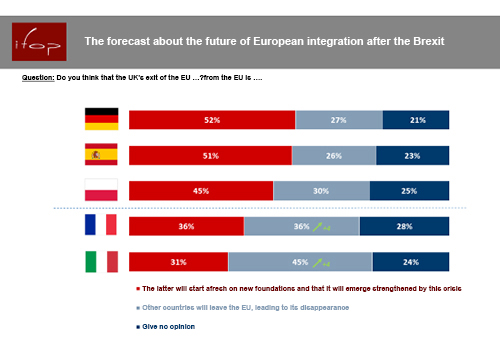
In these countries the idea of a knock-on effect has also gained ground since the survey in July (from 32% to 36% in France, from 41% to 45% of the Italians) and although the figure does not form a majority (due to the high share of people who prefer not to give their opinion on this issue, i.e. 28% of the French and 24% of the Italians), the gap is growing, with the idea that this exit might boost European integration amongst the Italians (45% believe in the knock-on effect against 31% in support of the scenario of a revival in European integration). Anticipation - even the expectation of other departures - is stronger amongst the populist parties such as the Front National (57%), Alternative für Deutschland in Germany (55%), Northern League (66%) and Five Stars Movement (58%) in Italy.
4. A less passionate opinion of the UK
The idea of an uncompromising position on the part of the EU with regard to the British remains high in people's minds in all countries, but this had receded somewhat in comparison with July 2016. Everything is occurring as if public opinion has digested the shock and has matured to adopt a more realistic stance. Moreover the French, Germans, Spanish and the Italians are of the opinion that as part of the negotiations with the UK the EU should make no concessions to the British and withdraw from them as quickly as possible all of the economic and trade advantages that were linked to belonging to the EU (49% of the French and Germans, 46% of the Spanish and 41% of the Italians), but not as vigorously as in July (we note a respective reduction of -4 points, -6 points, -5 points, -6 points).
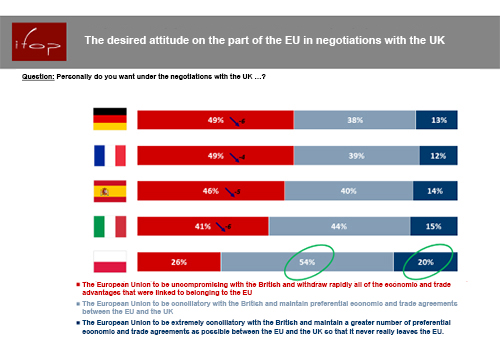
We might note however that as of July, and even now, the Poles adopt a much more conciliatory stance. More than half of them want the EU to be "quite conciliatory with the British and that it should maintain preferential economic and trade agreements between the EU and the UK (54%), and even for it to be "very conciliatory and maintain the greatest number of preferential economic and trade agreements as possible between the EU and the UK so that it never really leaves the EU" (20%). This greater benevolence probably finds it source in the links maintained between the UK and the recent arrival by Poland in the Union and also in the more structured concern on the part of the Poles about the Brexit (55% deem it "very serious" that the UK should be leaving the EU).
- 1 - Methodology
Methodology
This document presents the results of a study undertaken by Ifop. It respects the scientific and deontological principles of the survey to the letter. The information that it has produced reflects the state of the opinion when the survey was undertaken and in no way is it a forecast.
It cannot be published either entirely or partially without the IFOP's prior consent.
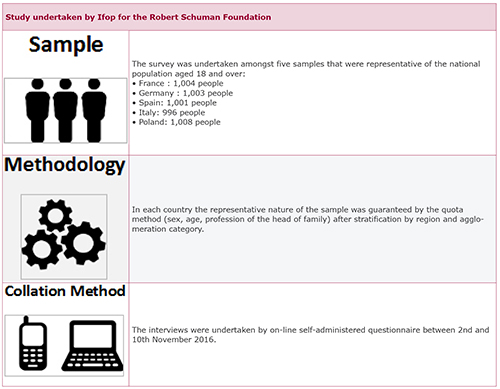
In each country the representative nature of the sample was guaranteed by the quota method (sex, age, profession of the head of family) after stratification by region and agglomeration category.
Collation Method
The interviews were undertaken by on-line self-administered questionnaire between 2nd and 10th November 2016.
Precision in terms of margins of error
Statistical theory makes it possible to measure the amount of uncertainty that has to be linked to each survey result. This uncertainty is expressed in a confidence interval that lies on both sides of the value observed and in which the true value of a specific probability is likely to lie. This uncertainty, which is commonly known as "the margin of error" varies according to the size of the sample and the percentage noted as shown in the table below:
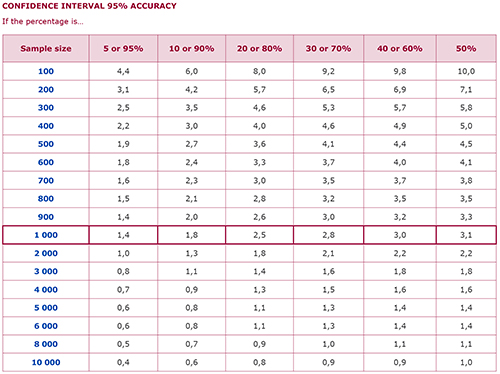
Example in reading the table: if there is a sample of 1 000 people, if the percentage measured is 10%, the margin of error is equal to 1.8. The true percentage lies therefore between 8.2% and 11.8%.
- 2 - Survey Results [2]
[1] Ifop Survey undertaken between 28th June and 6th July 2016
[2] Ifop Survey for the Jean Jaurès Foundation and the FEPS undertaken via self-administered questionnaire on-line between 28th June and 6th July 2016 amongst six samples representative of the national population aged 18 years and over: France (1 004 people), Germany (1 000 people), Italy (1 002 people), Spain (1001 people), Belgium (1007 people), Poland (1 012 people).
Publishing Director : Pascale Joannin
To go further
Future and outlook
Jean-Dominique Giuliani
—
23 April 2024
Health
Tiphaine Maloingne
—
16 April 2024
The Balkans
Pierre Mirel
—
9 April 2024
Democracy and citizenship
Maxime Lefebvre
—
2 April 2024

The Letter
Schuman
European news of the week
Unique in its genre, with its 200,000 subscribers and its editions in 6 languages (French, English, German, Spanish, Polish and Ukrainian), it has brought to you, for 15 years, a summary of European news, more needed now than ever
Versions :




